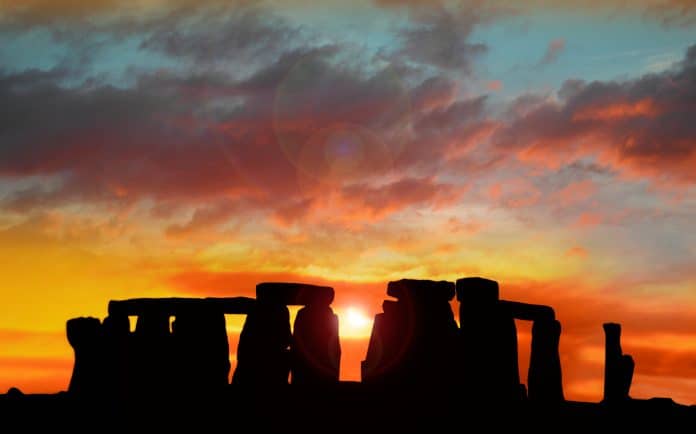The month of June brings endless possibilities. As the summer season rolls in, It is known for many as a time for love and celebrations such as graduations and weddings. June marks the official end of spring and the start of summer. This month gives us lazy afternoons, time for picnics, trips to the beach, and family vacations. With beautiful, long days come even more spectacular nights. On Saturday, June 3rd, the Strawberry Full Moon arrived in the sky and appeared full for several nights in a row between June 2-5.
It’s easy to see why June’s moon has been named the Strawberry Full Moon. Mother Nature shows off and gives us an array of colors during this time. But also, Native Americans gave the moon its name because they gathered June-bearing strawberries. The tribes of the northeast region found ripe red berries just as summer began. Another name given for June’s moon is the Green Corn Moon. Native Americans planted corn in the spring and saw young green stalks develop quickly in the warm summer sunshine.
Did you know that June 11th is National Corn on the Cob Day? I’m all for that! Mid-June in Florida is just the right time for the sweet taste of corn on the cob. This favorite snack goes by many names, such as pole corn, corn stick, sweet pole, butter pop, or long maize. Corn is delicious whether you like it boiled, microwaved, or grilled.
We can thank Native Americans for this summer staple. Years ago, they brought corn here while traveling up the Mississippi River. Corn began as a wild grass called teosinte, originally coming from Mexico. Early corn was nothing as we know it today; back then, it had very tiny ears and very few kernels. But over time, it was selectively bred, meaning the best seeds from the fullest plants were replanted year after year. Farmers yielded new plants with larger and larger ears. They produced ears that came with more and more kernels until they became much like the corn we know today.
How could we live without corn? It’s everywhere! It’s a key ingredient in many of our foods. How many times do we notice that we are eating or drinking something that contains high-fructose corn syrup? This sweetener made from corn starch is found in sodas, sweetened juices, processed desserts, salad dressings, and many of our prepackaged meals. Check the ingredient label. Where is your daily sugar intake coming from? Too much sugar of any kind is not good for us. High-fructose corn syrup (HFCS, for short) is considered an unwelcome addition to our diet. It’s a contributing factor to many of today’s health issues, such as obesity and diabetes. You may be eating too much sugar and not even know it!
It seems that nothing goes to waste from an ear of corn. “Field corn” or “cow corn” is a type grown mainly for livestock food, ethanol production, cereal, and processed food products. It has taller stalks and thicker leaves than sweet corn. It’s left in the fields until the ears are dry because it has a very high moisture content and must be dry to be processed. Field corn has very hard kernels needing milling before being useful. Sometimes it is milled with stalks and all! This corn is made into products like corn syrup, cornflakes, and corn flour.
Despite HFCS, the corn itself is beneficial. It’s rich in vitamin C and contains antioxidants that protect against disease and enhance our immune system. Yellow corn is a good source of several carotenoids, which aid eye health and help prevent lens damage.
June 21st is the summer solstice of 2023. It’s the first day of summer and the exact day when the sun reaches its northernmost point from the equator. It can occur anywhere between June 20-22. Solstice comes from the Latin words sol (sun) and sistere (to stand still). At the very top of the world, in the Arctic Circle, the sun really does appear to stand still and hug the horizon. During the summer solstice, the northern region has a continuous 24 hours of daylight, hence the term “Land of the Midnight Sun.” Here is a fun fact: Be sure to look at your noon-time shadow around the time of the first day of summer. It will be your shortest shadow of the entire year!
A special place to observe the first day of summer is at Stonehenge in Wiltshire, England. Thousands of tourists come each year and visit this prehistoric stone circle monument, cemetery, and archeological site. It was built to align with the sun on the solstices. On the summer solstice, the sun rises behind Stonehenge’s Heel Stone from the northeast horizon. The first rays of morning sunlight shine into the heart of Stonehenge. There is an annual festival and special occasion. The Summer Solstice at Stonehenge will be celebrated this year from 7 pm on Tuesday, June 20, to 8 am on Wednesday, June 21. The sunrise will be live-streamed on the official English Heritage YouTube channel.
June has important holidays. First, Sunday, June 18th, is Father’s Day 2023. It’s always the third Sunday in June. This year, it’s also the time of our New Moon. This special day began in the early 1900s to complement Mother’s Day. It gained momentum during the Great Depression as a way to recognize Dad and get him a gift to enjoy. Later in WWII, Dads were remembered for their service and sacrifice. However, Father’s Day wasn’t a nationwide holiday until 1972 under the administration of President Nixon. Another holiday is on Monday, June 19th. It’s called Freedom Day, Emancipation Day, or simply Juneteenth. This holiday dates back to the Civil War and recognizes the freedom of all enslaved people. Juneteenth marks the official end of slavery.
Quite a month! Celebrate June with family and friends as we mark the beginning of summer!

